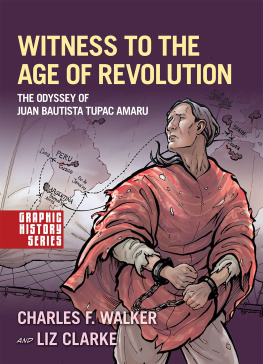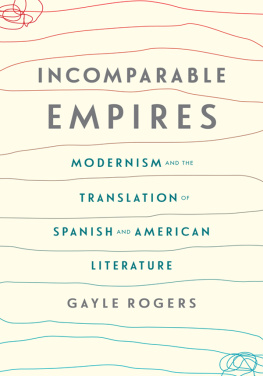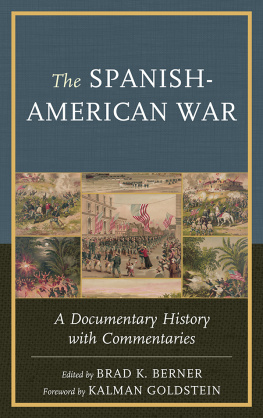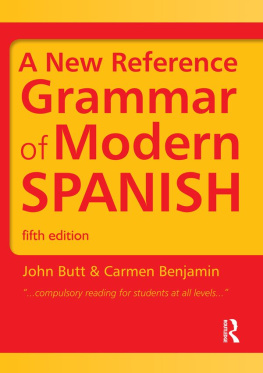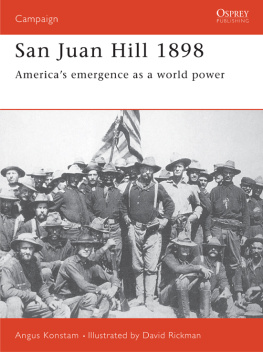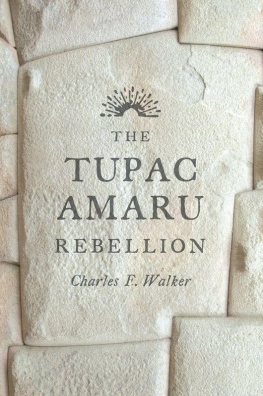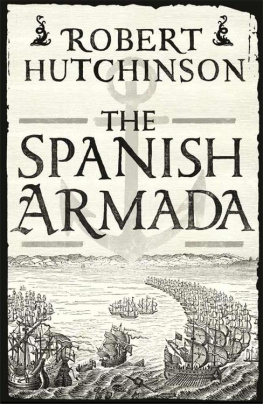R. A. Alger - The Spanish-American War
Here you can read online R. A. Alger - The Spanish-American War full text of the book (entire story) in english for free. Download pdf and epub, get meaning, cover and reviews about this ebook. year: 2011, publisher: Barnes & Noble, genre: History. Description of the work, (preface) as well as reviews are available. Best literature library LitArk.com created for fans of good reading and offers a wide selection of genres:
Romance novel
Science fiction
Adventure
Detective
Science
History
Home and family
Prose
Art
Politics
Computer
Non-fiction
Religion
Business
Children
Humor
Choose a favorite category and find really read worthwhile books. Enjoy immersion in the world of imagination, feel the emotions of the characters or learn something new for yourself, make an fascinating discovery.
The Spanish-American War: summary, description and annotation
We offer to read an annotation, description, summary or preface (depends on what the author of the book "The Spanish-American War" wrote himself). If you haven't found the necessary information about the book — write in the comments, we will try to find it.
On April 17, 1898, Congress declared war on Spain, initiating the Spanish-American War. Here is an insiders history of the war, written by the Secretary of War during the conflict. Chapters include, Unpreparedness for War, After the Capture of San Juan, Siege and Surrender of Santiago, and The Tagalog Rebellion. His firsthand account of the administration, battles, and lasting effects of the war is interesting reading for students of history.
The Spanish-American War — read online for free the complete book (whole text) full work
Below is the text of the book, divided by pages. System saving the place of the last page read, allows you to conveniently read the book "The Spanish-American War" online for free, without having to search again every time where you left off. Put a bookmark, and you can go to the page where you finished reading at any time.
Font size:
Interval:
Bookmark:
R. A. ALGER

This 2011 edition published by Barnes & Noble, Inc.
All rights reserved. No part of this publication may be reproduced, stored in a retrieval system, or transmitted, in any form or by any means, electronic, mechanical, photocopying, recording, or otherwise, without prior written permission from the publisher.
Barnes & Noble, Inc.
122 Fifth Avenue
New York, NY 10011
ISBN: 978-1-4114-4916-9
PREFACE
I T has not been my purpose in the preparation of the manuscript of this book to write a full history of the war with Spain; on the contrary, it has been to place on record some of the prominent facts connected with the organization, equipment, and movements of the army, together with the administration of the War Department, with the hope that such statement will serve a useful purpose as an example, should another crisis of the same kind occur.
The statements in this volume are based upon either my own knowledge or upon the official reports, verbal and written, made during my incumbency of the office of Secretary of War. The descriptions of the fights of Las Guasimas, Caney, San Juan, and Manila are based upon official documents, conversation with participants, and letters from officers high in authority received since the war. A personal visit to the battle-field of San Juan in the spring of 1899 has been of much service, making that field of operations somewhat familiar to me.
It has been my good fortune to have placed at my disposal the complete files of the correspondence received by and issued from the headquarters of the 5th Corps during the entire Santiago campaign. Many of these despatches are now published for the first time, and throw an interesting light on the history of the army which accomplished so much and which virtually ended the war with Spain.
An account of the Santiago army and the movements of the land forces in Cuba would not have been complete without a discussion of the relations between Admiral Sampson and General Shafter. The documents quoted in the chapter devoted to that matter should remove a great deal of misapprehension.
I wish to take this opportunity to thank numerous government officials and personal friends, in and out of the military service, for having materially aided me in the collection of data on various matters not coming under my direct observation.
Should war ever again come upon this country and find it so totally unprepared as it was in 1898, I hope that those who have been so profuse in their criticisms, and eager to discover faults, may have the patriotism and pride of country to rise above personalities, and, instead of striving to tear down, may endeavor to strengthen the hands of those upon whom the burden may fall and whose only hope of reward is that satisfaction which comes from the consciousness of having labored honestly and unremittingly to serve a government whose flag has never yet known defeat.

DETROIT MICHIGAN, 1901.
LIST OF MAPS
CHAPTER I
THE CUBAN SITUATION IN 1898
T HE thoughtful observer of public events during the years 189597 need hardly be reminded that both the Cleveland and the McKinley administrations sought by every honorable means to avoid complications with Spain, though protesting against the conditions prevalent in Cuba. Deplorable as those conditions were, and shocking as was their effect upon the enlightened and humane mind, neither Mr. Cleveland nor Mr. McKinley seemed to feel that this country should, because of them, plunge into war. The conservative and responsible men at the head of the nation's affairs were profoundly averse to war, although they encountered, in holding to this course, the growing opposition of public sentiment throughout the country. As the year 1896 drew to a close this opposition became formidable.Even conservative newspapers began to complain, not wholly without a semblance of warrant, that the goverment was leaning to the wrong side in its effort to stand exactly straight, and to hint that the navy had been converted into a police force for Spain's benefit. Denunciations of eminent Senators who advocated peace took on the quality of violence; indeed, towards the close of Mr. Cleveland's administration sympathy with the insurgent Cubans had become the popular test of human kindness, and protest against war the unanswerable proof of unchristian indifference. President McKinley, therefore, inherited not only the problem itselfa problem which had been steadily intensifying for yearsbut a popular demand for intervention which had attained serious proportions and could be resisted only with extreme difficulty. Nevertheless, quite apart from the ideas entertained by the people generally, the facts, as they were made known to the President and his Cabinet, contained material enough for profound anxiety. It was only too evident that a state of absolute barbarity existed in Cuba, and that inhuman cruelties were of daily and contrived occurrence.
President Cleveland had unfalteringly persisted up to the last hour of his term in the policy he had adopted two years previously. Apparently his purpose was to transfer the situation to his successor free from all embarrassments. The fact remains that the state of affairs could not have been more embarrassing if he had repeatedly modified his course between the spring of 1895 and March 4,1897. It was, in fact, inherently intolerable, and it had been made needlessly painful and distressing by a policy on the part of Spain which had provoked the bitterest and deepest resentment of the American people.
Negotiations, with a view to ameliorating conditions in Cuba, were inaugurated as soon as our envoy, General Stewart L. Woodford, reached Madrid. The President and his Cabinet were, one and all, sincerely anxious to avert war, and to that end they labored in genuine harmony, although some felt that an issue which should be at once honorable and peaceful was impossible. The President's honest and persistent effort to avoid or avert war justly entitles him to the gratitude of the American people.
Our negotiations at Madrid were encouraged, but they led to no result. A point was yielded here, another there. The diplomatic atmosphere was one of apparent friendship and conciliation, but the efforts were fruitless of practical results. It seems, however, to be characteristic of the Spaniard, as typified by his government, that, whereas he is always fruitful of alluring promise, he is invariably barren of performance.
The months dragged slowly onmonths marked by honest and unselfish effort on the part of the administration, alternately darkened and illumined by Madrid's varying moods. It was obvious that Spain had grown weary of the disheartening and futile struggle in Cuba, and that she lacked either the power or the will to terminate it. It was equally obvious that the United States could not postpone indefinitely the discharge of its responsibilities to civilization and to itself. The difficulty consisted in discovering a common ground upon which the countries could meet without sacrifice of material interests, moral obligations, or the pride of either. That discovery was never made. But the failure was not caused by any languor in the searchon our part, at leastand up to the very last, even after the destruction of the battle-ship Maine, there were those who believed that war could be averted.
Every one who followed the events of 1897 will remember that at last the administration demanded the recall of Weyler and a revocation of his reconcentrado edict. It is common knowledge also that Weyler was recalled, the edict revoked, and Captain-General Blanco sent to Havana, charged with the task of reorganizing the government of the island upon a basis of autonomy. It is difficult to say how far the proposed measures would have fulfilled the necessities of the situation. There is reason to believe, however, that it met the plans and wishes of the Autonomist party. No one can say with certainty that it would have failed, for it was never subjected to the test. The destruction of the
Font size:
Interval:
Bookmark:
Similar books «The Spanish-American War»
Look at similar books to The Spanish-American War. We have selected literature similar in name and meaning in the hope of providing readers with more options to find new, interesting, not yet read works.
Discussion, reviews of the book The Spanish-American War and just readers' own opinions. Leave your comments, write what you think about the work, its meaning or the main characters. Specify what exactly you liked and what you didn't like, and why you think so.





